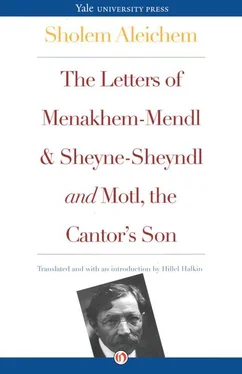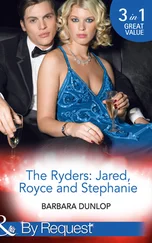“How can you even compare the two?” Moyshe asked. In no time they were having a grand fight about which yunye was bigger. We were all pretty sick of yunyes by the time Pinye shouted:
“We’re almost in New York!”
We all looked at the city, which was getting bigger and bigger. Wow, what a place! What monster houses! They were the sizes of churches, every one. And the windows, thousands of them! If only I had pencil and paper.
Ka-boom ka-boom! Wham-bangety-bang-bang! Bang! Ring-a-ling-a-ling-a-ling-a-ling! Hey hey hoo ha hey! Dddddrrrrrrrrrr! Whooooosh! Chakka-chakkachakkachakka-chakka! And ka-boom bangety-bang again! Plus the squeals of a trussed pig: oink-oink-oink-oink-oink!
Those were the sounds of our first minute in New York. Nothing, it now seemed, could have been more peaceful than a storm at sea. The real shock was dry land in America. A mob scene, a madhouse!
My mother panicked. Like a hysterical hen, she pecked and clucked and spread her wings over her chicks. “Motl!” she screamed, flapping her arms. “Mendl! Elye! Brokheh! Taybl! Where are you? This way! Over here!”
“For God’s sake, Mama,” Brokheh said. “What are you screaming for?” And Elye added: “They’ll send us back on the first boat to Europe if you don’t stop making such a fuss!”
“I’d like to see the day!” Pinye said, sticking his hands in his pockets and jamming his hat down sideways. “Every last Russky will croak before I do! Have you forgotten that God made America for poor, oppressed people like us?”
We were in the middle of a huge crowd. In another minute Pinye would have ended up on his back like in London. As it was, he got an elbow in the ribs. It gave him such a jolt that his cap went flying and was carried away by the wind. We spent so much time chasing it that we missed the stritkah. That’s what they call a tram in New York. But we didn’t have to wait long for another. We piled into it with our bundles, filling the empty seats, and off we went to the city.
“Thank God we’re rid of that leech of a tailor!” Pinye said.
“Don’t be so quick to celebrate,” Elye said. “With God’s help you’ll yet run into him in the streets of New York.”
The ride through New York was pretty awful. The worst part was changing from the stritkah to the eleveydeh. That’s a stritkah that runs on a long, narrow bridge above the ground. It flies like a bullet. You’re sure you’re going to die.
You think that’s all? Wait, I’m not through. You crawl out of the eleveydeh and walk down some stairs to a cellar and get into another stritkah called a tsobvey. The tsobvey rushes through the cellar until you feel faint. Elye says tsobvey is short for tsobveydeh and calls the eleveydeh an elevey. Brokheh swears she’s never taking either again. She’d rather walk than ride through the clouds or the earth like a lunatic. “Spare me your ups and you can have your downs,” she says.
She’s a weird one, my sister-in-law. If I had my druthers, I’d ride the eleveydeh and the tsobvey all day long. So would my friend Mendl.
You would think that having been around the world, in Lemberg, Cracow, Vienna, Antwerp, and London, we would know what a tram ride was like. For sheer torture, though, there’s nothing like suffocating in a crowded New York tsobvey. You stand shoulder to shoulder, hanging on to a strap to keep from falling, and two new passengers get on for every passenger who gets off. You hang there until you’re stiff because each seat has plenty of takers — and if you do find an empty one, you end up sitting with a big black goy on either side of you, Negroes with monster lips and huge white teeth who chew their cud like cows. It took me a while to find out that that’s called tshooinkahm. It’s a kind of candy made of rubber. You have to keep chewing because you’re not allowed to swallow it and you’re not allowed to spit it out. Small boys, old men, and cripples make a living selling it.
I must have told you about our friend Pinye’s sweet tooth. Well, he got hold of some tshooinkahm, swallowed a whole pack, and had such conniptions that he nearly died. The doctors had to pump out his stomach.
But I’m getting ahead of myself. Let’s return to our first ride in New York.
Everyone kept talking while we rode the eleveydeh and the tsobvey. But talking is not the right word. There was so much noise, such a racket, such a rattle of wheels and shrieking of rails and clanking of cars, that you couldn’t hear your own voice. You had to shout as if speaking to a deaf man. In no time we all were hoarse. My mother kept begging:
“Pesye, my sweet …Pesye, my darling …dear, dear Pesye …let’s talk later!”
For a moment we fell silent and then we shouted our lungs out again. We were only human, after all, good friends and neighbors who hadn’t seen each other in ages. How could we keep quiet? There was so much, so much to talk about!
After shouting about this and that, we got around to discussing where to go and whose house to put up at. It took some arguing to decide that Pinye, Taybl, my mother, and I would stay with Pesye, and Elye and Brokheh would go to Yoyneh and Riveleh’s. Pesye wanted Mendl to come with her too. Nothing doing, Riveleh said: Pesye had enough mouths to feed. Pesye didn’t like that one bit. A mouth, she said, never has too many teeth and a mother can’t have too big a family.
“You know what? Let’s ask the dinner guest in person.”
So said Moyshe the bookbinder and asked Mendl which he preferred: his and Pesye’s place or Yoyneh the bagel maker’s. Mendl said he would stick with me. I wouldn’t have expected any less.
“The next steyshn is our stahp,” Yoyneh announced.
It had to be explained to us that a tsobvey has steyshns and that your stahp is the steyshn you get off at.
“In-law! When did you learn to talk the language?” my mother asked Yoyneh. Riveleh answered:
“I promise you, in-law, you’ll be talking it in a week too. Because if you go out into the strit and ask for a meat store, you won’t get the time of day.”
“What should I ask for, then?” asked my mother.
“You have to ask for a butsheh shahp,” Pesye said.
“A plague take them all!” exclaimed Brokheh. “I don’t care if they burst. When I want meat, I’ll ask for it. Meat, meat, meat, meat, meat!”
All of a sudden it was Yoyneh’s stahp. He grabbed Riveleh, Elye, and Brokheh and rushed from the car. My mother rose to walk her son and daughter-in-law to the door. Pinye got up to say good-bye to Elye and arrange their next meeting. Before he knew it, Yoyneh’s family was on the platform and the conductor was shutting the doors. The tsobvey gave a lurch. Pinye was still trying to figure it out when his feet slid out from under him. A second later he was lying in a Negro woman’s lap. The woman flung him off with both hands and he went sprawling while the cap flew from his head. The tsobvey car burst into laughter. Mendl and I laughed too. Did we catch it from my mother and Taybl. Go have a face of stone like Brokheh!
All things come to an end. We arrived at our stahp and climbed down to the strit. If I hadn’t known we were in America, I would have guessed we were in Lemberg or Brody. The Jews were the same, their wives were the same, the noise was the same, and even the garbage was the same. Everything was just louder and more confusing. The buildings were taller, too, a whole lot. Six stories is a joke in New York. There are buildings that are twelve. And twenty. And thirty. And forty. And even more.
We stood there in the strit with all our bundles. We had to go on foot the rest of the way. The Americans call that vawkink. We vawked. Moyshe vawked ahead on his short legs and Pesye vawked after him, so fat and heavy she could barely keep up. Pinye and Taybl vawked behind Pesye. Pinye’s vawkink is a scream. He dances more than he vawks, his long, thin legs getting in his way, one pants leg rolled up, the other falling down, his cap perched sideways and his tie pointing east-by-northeast. A weird-looking fellow! He’s just begging for someone to draw him.
Читать дальше












